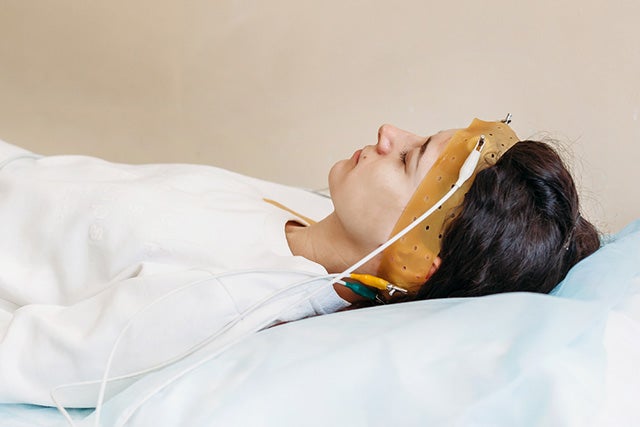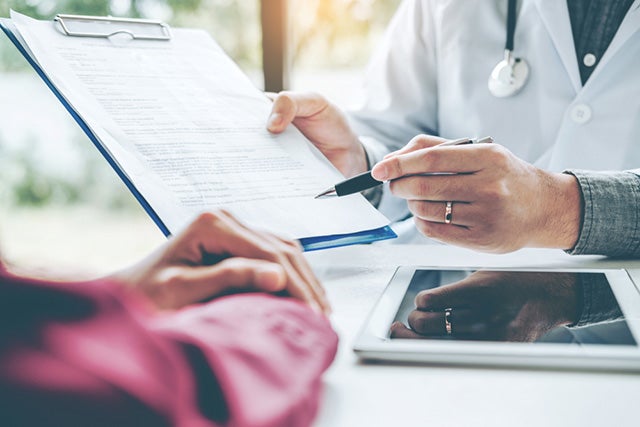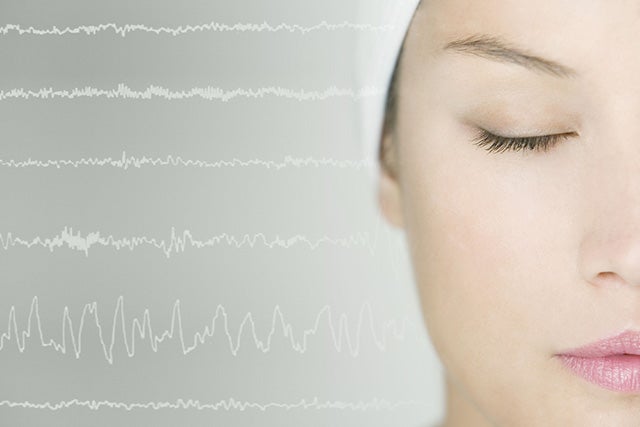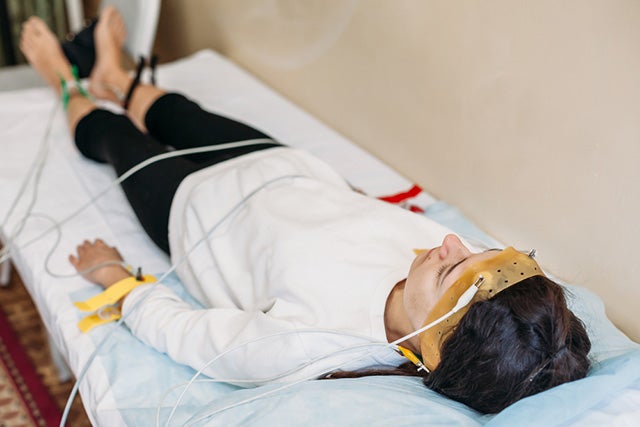At some point in your life you may have been, or will be, prescribed a sleep study of some sort. Sleep studies are a way for doctors to find a baseline of your sleep health to see how or if it is affecting other aspects of your overall health.
The anxiety of partaking in the study, the unknown of the results, and being forced to sleep in a strange environment creates an environment rife for insomnia. If you have struggled with sleeping in a sleep study, or have concerns about an upcoming study, read on to see what you can do to take control of this situation.
What is a Sleep Study?
While you sleep you cycle through various stages of your sleep cycle. Each stage provides various depths of rest for your body and mind, and is essential for your overall health. When you partake in a sleep study (also called a polysomnogram) various tests measure specific sleep characteristics in each sleep stage to help diagnose various disorders related to sleep and breathing.
The types of studies that may be included are brain wave activity measurements (Electroencephalography, eye movement measurements (Electrooculogram), muscle movement measurements (Electromyography), and possible heart activity measurements (electrocardiogram).
You will also most likely be videoed to determine overall body movement or agitation as well.
Studies are done in special sleep lab environments and are almost always scheduled during your normal sleeping hours. A sleep technician will be awake in a monitoring lab for part of the time as well to check all monitors are working as they should.
Why Would I Need a Sleep Study?
Sleep studies measure body movements, brain activity, breathing and heart patterns, oxygen saturation, and overall sleep patterns such as how long it takes to fall asleep and how deep you are sleeping.
Your doctor may require a sleep study for many different reasons since sleep disruptions can create other problems with your health. Common reasons include overwhelming daytime sleepiness, a sudden onset of sleep at any time in the day, restless leg syndrome, the inability to fall asleep easily, waking multiple times in the night, sleep apnea, sleep walking and talking, sleep terrors, and excessive snoring.
How Can I Get Ready For a Sleep Study?
There are things you can do to get ready for a sleep study, and it is best to take advantage of some good advice to help ease anxiety and know what to expect. If you can’t sleep during your study then a good baseline of what could be wrong is hard for a doctor to determine. If this happens they may have to schedule another one.
To help ready yourself for the most accurate study do the following:
- Bring a list of questions you may have when you meet with your doctor to get information about what to expect.
- Limit naps, sleeping in, or changing your normal sleep schedule leading up to the study.
- Make sure your doctor knows all the medications, prescriptions, and vitamins you take each day. Don’t start anything new unless specifically prescribed.
- Avoid caffeine for a few days leading up to the study.
- Be sure to complete the sleep questionnaire you will be given in advance.
- Feel free to shower before the study, but avoid lotions or anything else that may cause the electrodes to stick to your skin.
- Bring your most comfortable pajamas and your own pillow to the study. Chances are you will be allowed to use them.
- Remove any jewelry you may have on the day of the study.
- Be sure to put your phone and any other electronics you have on silent the evening of the study.
What Can I Do to Sleep During a Sleep Study?
During the study you can expect the following to occur:
- You will be asked to change into a gown or your pajamas and get comfortable.
- Electrodes will be positioned on your head and body to measure various things. Some may be connected to cables, but newer technologies have introduced wireless options.
- A pulse oximetry will be placed on your finger.
- Monitoring will begin before you fall asleep to see how long it takes you to fall asleep.
- You will know in advance where you will be woken for short nap intervals, be asked to stay awake, or allowed to sleep the full night.
In order for a sleep study to be accurate, you need to have a night’s rest that is similar to what you normally experience. It can be difficult to sleep in a strange space and with the anxiety of knowing the study is being done.
To help support the best test results, be sure to take advantage of the suggestions ahead of time that we offered above. This can help mentally and physically prepare you leading up to the sleep study night.
You can also do the following once you are ready to begin:
- Lie in your typical sleep position and get comfortable.
- Pretend the equipment isn’t connected to you. They are designed to stay put so you can sleep comfortably.
- Use relaxation techniques such as breathing exercises, muscle relaxation, and guided imagery. Meditation can also be helpful.
- Avoid any screens or your phone leading up to sleep, or while you are falling asleep.
- You can get up to use the restroom, but avoid turning on lights.
- If you wake up, try to fall back asleep using the above techniques.
You might want to check: Health Benefits Of Sleeping And How Far They Reach
Wrapping it Up
Being involved with any type of medical study can be nerve wracking. Plus, a sleep study is likely being prescribed due to a sleep issue – therefore it isn’t out of the ordinary to be worried, concerned, or simply uncomfortable with the entire process.
Be sure to prepare yourself in the best way possible, including asking all the questions you need answers from your doctor. Readying yourself a few days leading up to the study, and the day of, can really help you relax that evening. Once the study starts, be sure to get yourself comfortable and relax as best you can.
Photo credit: Gorodenkoff/Shutterstock; Image Point Fr/Shutterstock;
Joyseulay/Shutterstock; NPS_87/Shutterstock




